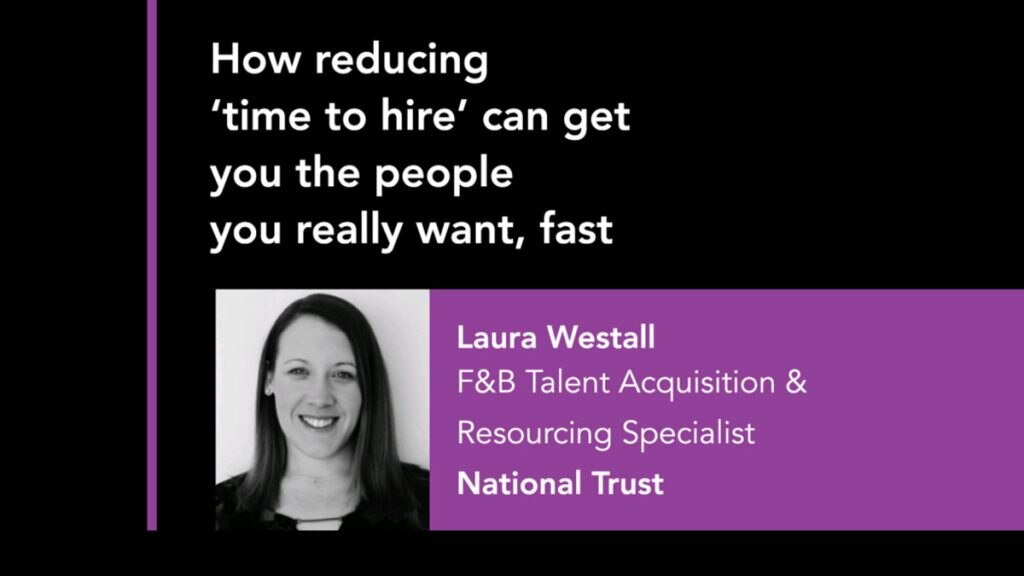The National Trust’s cutting of time-to-hire from 32 to 18 days saw them win the ‘Rising Talent’ award at Caterer.com People Awards 2019
The recruitment cycle is a fact of life for hospitality businesses and ‘time to hire’ can be a major factor in getting the people you want.

The National Trust, worthy winners of the 2019 Caterer.com Rising Talent Award, has taken a dynamic approach to recruitment with some outstanding results.
After only 10 months in post, to describe Laura Westall, F&B Talent Acquisition & Resourcing Specialist with the National Trust as enthusiastic is an understatement. Her passion for her role and the people she works with is palpable.
After extensive experience in the recruitment industry, Laura has put her skills into action, not only to assist with the change in the way the National Trust viewed their food and beverage offering, but also the way they managed their recruitment processes.
Historic buildings, tea and scones
Challenges were numerous for Laura in her newly created role. For many, the National Trust means historic buildings, tea and scones. The task was to bring about a change that positioned the Trust as a first choice employment destination with on-going career opportunities.
The 48 properties that make up Laura’s patch are diverse and each one follows its own recruitment plan. The Trust recognised that reviewing and restructuring recruitment within F&B could make a huge impact on revenue, resources and recruitment costs.
The end of 1500 word job adverts
Historically National Trust recruitment adverts ran to 1500 words, a lot when you’re looking for an F&B team member, and detailed the history, location, interesting facts about the property and not much about the role. Laura cut recruitment ads to 500 words max, focused on the role, the passion required, the venue as a destination of choice and the career options available.
Reducing time to hire
Time to hire was averaging 32 days and by implementing new procedures, ensuring that every applicant is responded to quickly, these new procedures have seen a decrease in “Time to Hire”, now averaging 18 days.
It’s all about Mondays
The Trust receives nearly 15,000 job applications every month and by using analytics noticed that most people applied for vacancies on Mondays and Tuesdays. That’s when job ads drop now with a 14-day closing deadline. Within the 14 days properties are encouraged to interview any suitable candidates and can make an offer for the right person.
On day 7 the property, using its own social media channels, promotes the vacancy to a wider audience. The overall aim is to have someone in place within 21 days.
All property managers were given training in recruitment techniques and a policy of recruitment for attitude, not skills, was implemented.
On-boarding across different venues
Apart from Laura’s role, on-boarding was looked at and it highlighted that many venues, in close proximity to each other, were not aware of what each was doing, and were hiring agency staff to fill gaps at peak periods or during times when they were struggling to fill rotas.
During on-boarding recruits work at nearby properties, meeting the teams and can confidently fill gaps as necessary, reducing agency spend. Only 5% of requirements are now filled by agency staff, 95% are filled using staff sharing, recruiting right the first time to market, meaning a massive reduction in spend.
Make fast decisions
As a charity, the National Trust doesn’t have the luxury of paying top wages and properties are often in the locations that aren’t served by public transport. Because they are now moving quicker, being more proactive and also sharing vacancies on their social media channels the whole recruitment process has become much more effective.
The Trust has seen a considerable drop in vacancies as retention has soared, recruitment costs are down and by sharing resources the Trust is now employing the right people in the right roles.
Laura’s top 3 tips
We asked Laura if she had any words of advice for hospitality businesses facing similar recruitment challenges.
1. Plan your interview questions
Sounds simple but many employers use a one size fits all approach. Be prepared; hospitality is a people business and every person is different.
2. Recruit for attitude, not skill sets
Recruits with the right attitude are willing to learn and by delivering great on-boarding and training experiences recruits are more likely to stay with you longer and be more loyal.
3. Get your management teams on board from the outset
Ultimately it is their responsibility to deliver the day-to-day training and the success of any programme lies with them.